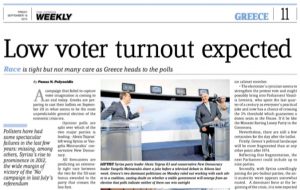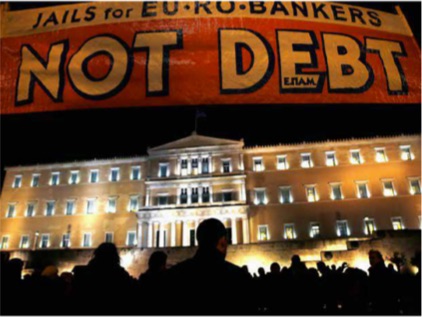A campaign that failed to capture the voters’ imagination is coming to an end today, and Greeks are preparing to cast their ballots on Sunday in what seems to be the most unpredictable general election of the economic crisis era.
Opinion polls are split over which of the two major parties is leading – Alexis Tsipras’ left-wing Syriza or Vangelis Meimarakis’ conservative New Democracy; but they all project an extremely tight race between the two for the 50-seat bonus awarded to the party that crosses the line first.
Pollsters have had some spectacular failures in the last few years: missing, among others, Syriza’s rise to prominence in 2012, the wide margin of victory of the ‘No’ campaign in last July’s referendum and the extent of the electoral footprint of Golden Dawn, the neo-Nazi movement that found its way into mainstream politics taking advantage of the disillusionment due to the economic depression and tensions created by massive immigration.
This time around uncertainty about the result is enhanced by a few more factors:
- Tsipras undermined his own political hegemony by making a spectacular U-turn in his anti-austerity policy and signing a third bailout deal with the country’s creditors.
- As a result, Syriza’s radical left faction defected to claim the anti-austerity vote.
- ND is led by a caretaker leader after last January’s crushing defeat, but despite this seems to recover.
- Unusually large numbers of voters look unwilling to go to the polls.
- Dirty-war tactics were employed in the run up to the ballots, causing cries of foul by ND and Syriza.

Panos Kammenos fighting for political survival
Panos Kammenos, leader of the anti-austerity Independent Greeks that was the junior coalition partner in Tsipras’ government, accused Meimarakis of shady deals during his tenure as Defence Minister years ago.
And the construction company of Alekos Flampouraris, Tsipras’ mentor, was linked to public contracts awarded during the time he was a senior cabinet member.
The electorate’s cynicism seems to strengthen the protest vote and possibly bring into Parliament Vassilis Leventis, who spent the last quarter of a century as everyone’s practical joke and now has a chance of crossing the 3% threshold which guarantees a dozen seats in the House. It’d be like the Monster Raving Loony Party in the Commons.
Nevertheless, there are still a few certainties for the day after the ballot.
- Firstly, Greece’s political landscape will be more fragmented than at any other point after 1974. Reflecting that fragmentation, the next Parliament could include up to nine parties.
- Secondly, with Syriza unwillingly joining the pro-bailout parties, the anti-austerity wave appears somewhat muted. A dominant force at the beginning of the crisis, it is now expected to attract no more than a fifth of the votes.
- Thirdly, Greece will need a broad coalition government, and the parliamentary arithmetic may call on ND and Syriza to work together. As part of his electoral strategy, Tsipras remains adamant that he wouldn’t agree to join forces with what he calls the establishment, but a deadlock that would lead to yet another election as a result of his refusal would probably be detrimental to his popularity.
Will Sunday’s election arm Greece with a government strong enough to implement painful reforms to the state and markets?
If indeed Syriza joins a government coalition to implement the bailout agreement, fresh questions will be raised about the party’s unity, as more defections would be a realistic threat.
But the main issue is whether Sunday’s general election will arm Greece with a government strong enough in Parliament and among the public, so as to implement painful reforms to the state and markets, improve the provisions of the current bailout and make the most of the additional €86-billion loans in order to turn the country around after six long years of economic meltdown.


![Krugman: If Tsipras accepts the dictates of the Troika, how is he different? [vid] Krugman: If Tsipras accepts the dictates of the Troika, how is he different? [vid]](https://serpico.gr/wp-content/uploads/2018/07/paul_krugman-2.png)


